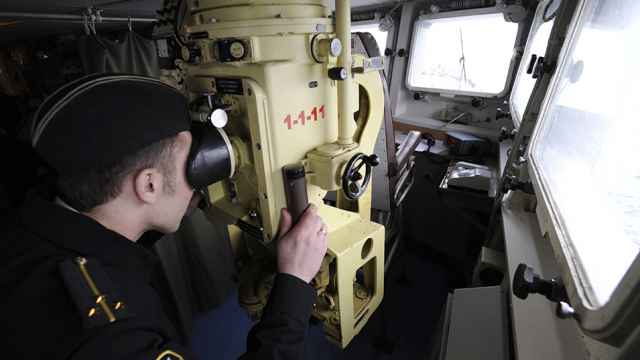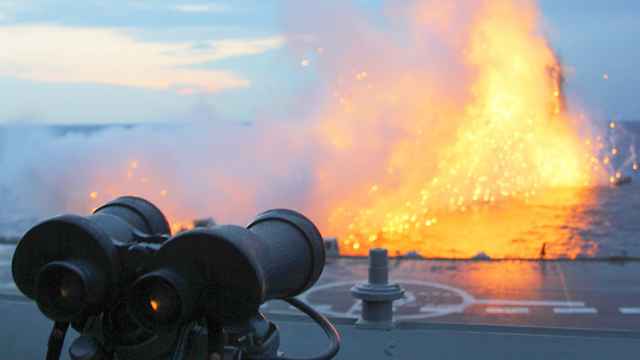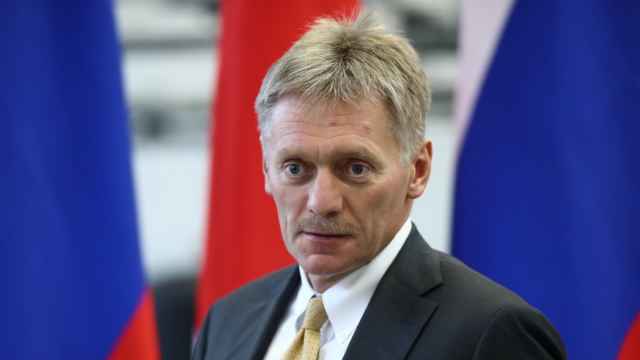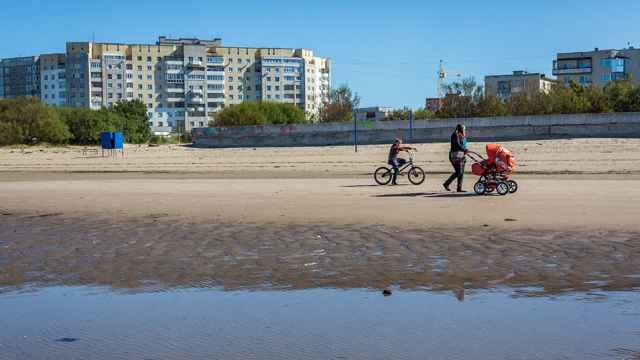At least five nuclear experts have been killed in a mysterious explosion during a rocket engine test at sea in northern Russia last week.
Officials have been slow to release information about Thursday’s blast, which led to a radiation spike in a nearby city and sparked heightened demand for iodine.
U.S.-based nuclear experts said they suspected the explosion occurred during the testing of a nuclear-powered cruise missile touted by President Vladimir Putin last year.
Here’s what we know about the explosion so far:
What happened?
— The rocket's fuel caught fire, causing it to detonate and knock several people into the White Sea, the state nuclear agency Rosatom was quoted as saying by the state-run TASS news agency. The explosion took place at around 6:00 a.m. on Aug. 8, according to one expert's reading of nuclear data.
— Officials in the nearby city of Severodvinsk said radiation had briefly spiked without saying how high, but their statement was taken down on Friday without explanation. Regional media reported that local residents had begun stocking up on iodine, which is used to reduce the effects of radiation exposure.
— Authorities said after the incident they had shut down part of a bay in the White Sea, although public shipping information from the port of Arkhangelsk showed the area had been closed for the preceding month. It did not say why.
What are the authorities saying?
— The involvement of nuclear workers was acknowledged for the first time by Russia's state nuclear agency Rosatom on Saturday. It said three of its staff members have been hospitalized.
— On Monday, Rosatom CEO Alexei Likhachev said staffers at its affiliate nuclear center died during testing of an unspecified “new special diesel.” Likhachev added that Rosatom will “finish” works on new weapons systems without specifying what weapons he was referring to.
— In a video interview published late on Sunday, Russian officials at the nuclear research institute where the scientists had worked said the accident had caused a twofold rise in radiation levels that had only lasted an hour.
— Meanwhile, Russia’s consumer watchdog branch in the Leningrad region has assured St. Petersburg residents that radiation levels are “stable.”
— The Kremlin on Tuesday gave its first official comments on the incident, with spokesman Dmitry Peskov saying that the authorities would do everything in their power to ensure citizens' safety.
What is the media reporting?
— St. Petersburg’s Fontanka.ru news website quoted a video statement by one of the leaders of the nuclear center as suggesting that the blast occurred at a “compact nuclear reactor.”
— Fontanka later updated its report with a statement from Rosatom which said that the suggestion referred to “tests of a radioisotope power supply,” not a “reactor.”
“It’s a nuclear battery, just so you understand,” the state nuclear monopoly was quoted as saying.
— Vyacheslav Solovyev, one of the officials at the institute in the closed city of Sarov, said: “These developments are also actually happening in many countries. The Americans last year...also tested a small-scale reactor... Our center also continues to work in this direction.“
— Russian media have said the rocket engine explosion may have occurred at a weapons testing area near the village of Nyonoksa. Those reports say an area near Nyonoksa is used for tests on weapons, including ballistic and cruise missiles that are used by the Russian Navy.
— Local media reported Tuesday that an Arkhangelsk region district hospital had “sealed off everything that had to do with admitting and treating the victims of the explosion in Nyonoksa.” The Federal Security Service (FSB) has summoned medical personnel and doctors have signed non-disclosure agreements, the region’s newsnord.ru website reported.
— Residents of Nyonoksa will be evacuated by a special train for two hours early Wednesday morning for planned military activities, the state-run RIA Novosti news agency reported.
Villagers told the 29.ru news website that “this is planned, everyone is taken from the village about once a month, although some used to stay behind.”
“But now, after the latest events, I think everyone will leave,” 29.ru quoted an unnamed villager as saying Tuesday.
— An image released by a small satellite firm appears to show the Serebryanka, a ship that carries nuclear fuel and waste, offshore from the Nenoksa Missile Test Site. Its presence “may be related to the testing of a nuclear-powered cruise missile,” Jeffrey Lewis, a nuclear scholar at the Middlebury Institute, wrote on Twitter.
Casualties:
— Rosatom named the five nuclear experts as Alexei Vyushin, Evgeny Koratayev, Vyacheslav Lipshev, Sergei Pichugin and Vladislav Yanovsky. The agency released the five experts' photos to the RBC news website on Monday.
— As many as six other staff members were injured and transported by helicopter to Moscow to be treated for radiation exposure, the Baza Telegram channel reported. The workers were brought from the airplane to a Moscow hospital in vehicles wrapped in film, the Telegram channel added. Rosatom has said that three people were injured in the blast.
— The experts, who worked for the center based at the closed city of Sarov, have been put forward for state awards, officials said, without specifying which honors they might receive.
— The Sarov city administration announced two days of mourning, saying Sunday the experts died while "performing a task of national importance." Russia held a memorial service for the five scientists on Monday.
Reuters contributed reporting to this article.
A Message from The Moscow Times:
Dear readers,
We are facing unprecedented challenges. Russia's Prosecutor General's Office has designated The Moscow Times as an "undesirable" organization, criminalizing our work and putting our staff at risk of prosecution. This follows our earlier unjust labeling as a "foreign agent."
These actions are direct attempts to silence independent journalism in Russia. The authorities claim our work "discredits the decisions of the Russian leadership." We see things differently: we strive to provide accurate, unbiased reporting on Russia.
We, the journalists of The Moscow Times, refuse to be silenced. But to continue our work, we need your help.
Your support, no matter how small, makes a world of difference. If you can, please support us monthly starting from just $2. It's quick to set up, and every contribution makes a significant impact.
By supporting The Moscow Times, you're defending open, independent journalism in the face of repression. Thank you for standing with us.
Remind me later.






